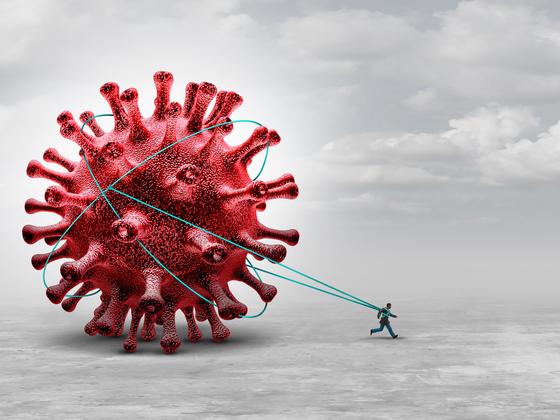
Coping with long Covid: 10 strategies for academics
Long Covid would hit anyone hard, no matter their job – but academia’s culture of high stress, high workloads and high expectations makes the impact greater still. Here, Kerstin Sailer offers advice for scholars living with the condition’s often debilitating symptoms

You may also like
Popular resources
The new academic year is upon is and campuses all over the country are again buzzing like beehives. The understandable excitement is dampened only if you look very closely. Who is missing?
Well, me for one. I am a professor, and I am forced to watch from the sidelines this year as college is gearing up towards business as usual. I contracted Covid-19 in October 2021, and I am still off work suffering from long Covid. Like many others in my situation, I experience chest pains, crushing fatigue, dizziness, shortness of breath, insomnia, cognitive issues and a whole range of other unpleasant obscure symptoms on a daily basis.
Anyone would be hit hard by this situation, no matter their role and position, but pair this with a dominant academic culture of continuously demanded high performance, high stress, high workloads and high expectations both from oneself and institutionally, and it becomes an explosive mix.
Long Covid on campus
In year three of the pandemic, we still don’t seem to know what to do. It is increasingly clear that collectively, as a society but also as institutions and local academic communities, we have no idea how to react to this public health crisis that is mirrored in thousands of individual health crises. Politics has declared the pandemic to be over, society is shutting its eyes, protection has become an individual responsibility, and academic institutions are following suit with events resuming in person, on campus and without mask mandates.
- How to disagree about Covid vaccination and manage other difficult university staff discussions
- How educators can help manage Covid anxieties on campus
- Slowing down earlier in the pandemic went well – so why speed back up?
This excludes vulnerable staff (and students) from equal participation in our workplaces, and as such is highly problematic for institutions aiming for more equality, diversity and inclusion.
It is also a gamble. Most recent research suggests that despite difficulties estimating the prevalence of long Covid, about one in eight Covid infections leads to long Covid. Obviously, not everyone is completely unable to work for 11 months like me, but even being incapacitated for three to six months should be worrisome enough.
Academic institutions need to develop more inclusive and collective practices around healthy environments for everyone, but in the meantime, affected individuals require new ways of coping. I’m hoping that by sharing 10 strategies for dealing with long Covid in academia from my own experience, I can raise our collective voices and offer solace to those with less ability to be seen and heard. I also wish to raise awareness among colleagues, many of whom are likely going to be asked to cover for missing staff and need to deal with increasing student requests for accommodations.
How to cope with long Covid as an academic
- Slow down and develop patience and stoicism like you’ve never done before. This is easier said than done amid the highly active and stressful lifestyles of most academics. But long Covid is no sprint, and there’s no medal at the end if you try to run as fast as you used to.
- Rest and pace. This means breaking down tasks into smaller chunks with regular breaks. Yes, it’s annoying to stop high-level-thinking tasks every 30 minutes for an equally long break, but pushing through with work is likely going to cause crashes later and, possibly, a worsening of your baseline condition. Remain firmly within your energy envelope and build up slowly over time. Don’t underestimate how much energy the brain requires. Thinking is hard work for a body in recovery.
- Learn the art of graciously saying “no”. There is no better time for this than now. I know the temptation of new ideas, new projects, new collaborations, new datasets only too well. Most academics are notorious “yes”-sayers. And obviously there are sector pressures, especially for more junior colleagues. There is nothing wrong with enthusiasm and being open to new things, but we should be equally enthusiastic about our own health.
- Prepare, prepare, prepare. I was able to accept and deliver a recent keynote talk at a conference only because the organisers allowed me to record the talk in advance. It took me weeks to do this – in half-hour chunks – but I did it. The same goes for other duties, such as teaching. I used a flipped-classroom technique for my lectures during the early pandemic and am very glad those recordings are now available for my colleagues covering for me at present.
- Don’t be shy about asking for help. Nurture your support network, and if you don’t have one, build it now. Delegate as much as possible. If you are senior, this can be a good way to promote more junior colleagues to step up, especially for tasks that come with recognition (such as conference keynotes or invited book chapters).
- Raise awareness institutionally, departmentally and with colleagues. Many people still do not know enough about long Covid, and symptoms present themselves individually for each of us. Even sympathetic and supportive colleagues will not know exactly what you can and can’t do easily. If you are healthy yourself, become an ally.
- Use resources such as those provided by the Long Covid Work group to gain a better understanding of return-to-work processes, occupational health assessments and other HR policies.
- Request specific accommodations to assist a return to work – for instance, remote rather than in-person teaching. Ask for specific risk assessments of workplaces, and enquire about measures that support your health and well-being at work, such as HEPA air filters in buildings to avoid the risk of a reinfection.
- Challenge the widespread ableist culture in academia. Many chronic illnesses are invisible by nature. It doesn’t mean they don’t count. A wonderful example was set by a department at Boston University to introduce a voluntary masking mandate based on values of inclusivity – local academic communities can make a difference if they want to.
- Build peer-to-peer solidarity and wisdom. Ask your university for other colleagues in your department or institution who are affected and whether you can be put in touch. Join a community group such as the Long Covid Body Politic community on Slack. Sharing experiences is a powerful way to feel less alone and gain back agency.
Kerstin Sailer is a professor in the sociology of architecture at University College London’s the Bartlett School of Architecture.
If you would like advice and insight from academics and university staff delivered direct to your inbox each week, sign up for the Campus newsletter.



Comments (0)
or in order to add a comment